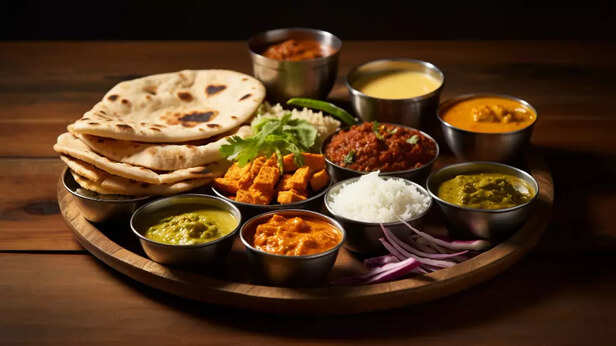Why Indians Are Letting Go of Tradition While Germans Are Falling in Love with It: Discover What’s Driving the Trend?
Shristy sinha | Mar 03, 2025, 23:13 IST
A Foreigner Women in Indian Attire
The article explores the growing interest of Germans in Indian culture, particularly in areas such as yoga, meditation, Bollywood, and cuisine. Meanwhile, younger Indians are increasingly looking towards modernization and global trends, often distancing themselves from traditional Indian practices and customs.
In recent years, an interesting cultural phenomenon has been emerging: Germans are increasingly fascinated by Indian culture, while many Indians seem to be distancing themselves from their traditional roots. The contrast is striking—India, a nation with a rich and diverse cultural heritage, is witnessing a shift where the younger generations, particularly in urban areas, are increasingly focusing on modernization and global trends, leaving behind centuries-old practices. On the other hand, Germans—many of whom have historically been less exposed to Indian traditions—are now immersing themselves in everything from yoga and meditation to Bollywood and Indian cuisine.
What has sparked this cultural shift? Why are Germans increasingly drawn to the traditions and philosophies of India, while Indians themselves are moving away from their own heritage? This article seeks to explore the key drivers behind this trend.
To understand why Germans are so enchanted by Indian culture, it is essential to look at the broad appeal it holds. Historically, Germany and India have had limited cultural exchanges, but over the last few decades, this has changed. Germans are particularly drawn to the spiritual aspects of Indian culture—yoga, meditation, and Ayurveda (traditional Indian medicine). These practices, which emphasize well-being and a holistic lifestyle, resonate with many Germans who are seeking balance in their busy, often stressful lives.

One of the most significant reasons behind the growing interest in Indian culture in Germany is the widespread popularity of yoga and meditation. These practices are often associated with inner peace, self-reflection, and personal growth—values that align with the desires of many people in modern, fast-paced societies like Germany. Yoga, for example, is not just about physical postures but is deeply connected to philosophy and spirituality. It’s seen as a way to harmonize the body and mind, offering mental clarity and emotional stability.
In Germany, yoga studios have proliferated in recent years, and many Germans, especially those in urban areas, have embraced it as a way of life. According to surveys, Germany is one of the largest markets for yoga outside of India. Similarly, meditation techniques such as mindfulness have gained traction, becoming a regular part of the wellness culture in the country. The appeal lies not only in the spiritual benefits but also in the promise of stress relief and the ability to manage the pressures of modern living.

Apart from yoga and meditation, Germans have also developed a strong affinity for other aspects of Indian culture, such as Bollywood films and Indian cuisine. Bollywood movies, known for their vibrant storytelling, music, and dance, have captivated audiences worldwide, including in Germany. The colorful extravagance of Bollywood films offers an escape from the more serious tone of Western cinema, and many Germans find the mix of drama, romance, and musical numbers refreshing.
Similarly, Indian cuisine has become a favorite among Germans, particularly in urban centers. Indian spices, flavors, and dishes like curry, tandoori, and biryani are enjoyed not only by the Indian diaspora but also by the broader population. Indian restaurants have flourished, and people appreciate the diverse range of vegetarian options, which fit into the growing trend of plant-based diets in Germany. The richness and complexity of Indian food offer a sensory experience that attracts food enthusiasts.
While German fascination with Indian culture is growing, many Indians, particularly the younger generation, seem eager to move away from tradition. This trend is not about outright rejection of Indian heritage, but rather a desire to modernize, globalize, and redefine what it means to be Indian in a rapidly changing world.
India, with its booming economy and increasing connectivity to the world, is at the forefront of globalization. Young Indians are increasingly looking toward the West, seeking global opportunities in technology, education, and career paths. The influence of global pop culture, especially from the U.S. and Western Europe, is undeniable. In cities like Mumbai, Delhi, and Bangalore, many young people are more likely to tune into international music, watch Western films, and consume fashion trends from Paris and New York rather than from traditional Indian sources.
As India’s young people become more globally connected, they often see their own culture as something of the past, something that belongs to the older generation. While there is respect for India’s rich history and traditions, there is a growing sense that these customs are no longer aligned with the modern, progressive identity they wish to cultivate.
Another reason why many Indians are distancing themselves from traditional culture is the pressure it places on individual freedom. Indian society has long been shaped by deeply rooted traditions, whether in family structures, marriage customs, or religious practices. The weight of these expectations can feel suffocating to younger Indians, especially in urban areas where individualism and personal choice are more highly valued.
The younger generation often feels that the traditional norms imposed by society, such as arranged marriages, gender roles, or rigid career paths, are no longer compatible with their aspirations. As a result, they are increasingly turning away from these conventions and embracing lifestyles that align with their personal beliefs and ambitions. In this context, traditional practices can sometimes feel outdated or restrictive.
For many Indians, there is also an inherent desire to break away from what they perceive as an antiquated past. This is particularly true among young professionals who are working in global industries like technology, finance, and entertainment, where being attuned to the latest trends, ideas, and innovations is crucial. For them, the future is seen through the lens of innovation, digitalization, and modernity rather than through the lens of history and tradition.
While the trend of letting go of tradition may seem dominant in certain segments of Indian society, it’s important to note that it’s not a complete rejection of the past. Many Indians are still deeply proud of their heritage and continue to celebrate it in various ways—through festivals, family gatherings, and cultural practices. However, the way in which these traditions are interpreted and practiced is evolving.
At the same time, Germans' growing fascination with Indian culture doesn’t imply a lack of their own traditions; rather, it represents an appreciation for something different, a desire to enrich their own lives with practices that promote wellness, balance, and a deeper sense of self. It is also worth noting that cultural exchanges are a two-way street. While Germans may adopt elements of Indian culture, the global Indian community is also influenced by the cultures they interact with, particularly Western ones.
The phenomenon of Germans embracing Indian culture while Indians seem to be moving away from it is indicative of broader global trends. For Germans, Indian culture offers a path to spiritual growth, relaxation, and a refreshing alternative to the stresses of modern life. For Indians, the pursuit of modernization, individual freedom, and global influence is reshaping their relationship with their heritage. Ultimately, both cultures are navigating the complexities of a globalized world, where the exchange of ideas, values, and traditions is constant and ever-evolving.
This cultural juxtaposition highlights the ways in which identity, tradition, and modernity are constantly in flux. As both Germany and India continue to evolve, it will be fascinating to see how these cultural currents intersect and influence one another in the years to come.
What has sparked this cultural shift? Why are Germans increasingly drawn to the traditions and philosophies of India, while Indians themselves are moving away from their own heritage? This article seeks to explore the key drivers behind this trend.
The Appeal of Indian Culture in Germany
Yoga and Meditation: A Path to Inner Peace

Women doing Meditation
One of the most significant reasons behind the growing interest in Indian culture in Germany is the widespread popularity of yoga and meditation. These practices are often associated with inner peace, self-reflection, and personal growth—values that align with the desires of many people in modern, fast-paced societies like Germany. Yoga, for example, is not just about physical postures but is deeply connected to philosophy and spirituality. It’s seen as a way to harmonize the body and mind, offering mental clarity and emotional stability.
In Germany, yoga studios have proliferated in recent years, and many Germans, especially those in urban areas, have embraced it as a way of life. According to surveys, Germany is one of the largest markets for yoga outside of India. Similarly, meditation techniques such as mindfulness have gained traction, becoming a regular part of the wellness culture in the country. The appeal lies not only in the spiritual benefits but also in the promise of stress relief and the ability to manage the pressures of modern living.
Bollywood and Indian Cuisine: A Globalized Love Affair

2150857812
Apart from yoga and meditation, Germans have also developed a strong affinity for other aspects of Indian culture, such as Bollywood films and Indian cuisine. Bollywood movies, known for their vibrant storytelling, music, and dance, have captivated audiences worldwide, including in Germany. The colorful extravagance of Bollywood films offers an escape from the more serious tone of Western cinema, and many Germans find the mix of drama, romance, and musical numbers refreshing.
Similarly, Indian cuisine has become a favorite among Germans, particularly in urban centers. Indian spices, flavors, and dishes like curry, tandoori, and biryani are enjoyed not only by the Indian diaspora but also by the broader population. Indian restaurants have flourished, and people appreciate the diverse range of vegetarian options, which fit into the growing trend of plant-based diets in Germany. The richness and complexity of Indian food offer a sensory experience that attracts food enthusiasts.
The Indian Perspective: A Move Towards Modernization
The Globalization of Identity
As India’s young people become more globally connected, they often see their own culture as something of the past, something that belongs to the older generation. While there is respect for India’s rich history and traditions, there is a growing sense that these customs are no longer aligned with the modern, progressive identity they wish to cultivate.
The Pressure of Tradition
The younger generation often feels that the traditional norms imposed by society, such as arranged marriages, gender roles, or rigid career paths, are no longer compatible with their aspirations. As a result, they are increasingly turning away from these conventions and embracing lifestyles that align with their personal beliefs and ambitions. In this context, traditional practices can sometimes feel outdated or restrictive.
A Desire for the New
The Balance Between Tradition and Modernity
At the same time, Germans' growing fascination with Indian culture doesn’t imply a lack of their own traditions; rather, it represents an appreciation for something different, a desire to enrich their own lives with practices that promote wellness, balance, and a deeper sense of self. It is also worth noting that cultural exchanges are a two-way street. While Germans may adopt elements of Indian culture, the global Indian community is also influenced by the cultures they interact with, particularly Western ones.
Conclusion
This cultural juxtaposition highlights the ways in which identity, tradition, and modernity are constantly in flux. As both Germany and India continue to evolve, it will be fascinating to see how these cultural currents intersect and influence one another in the years to come.
